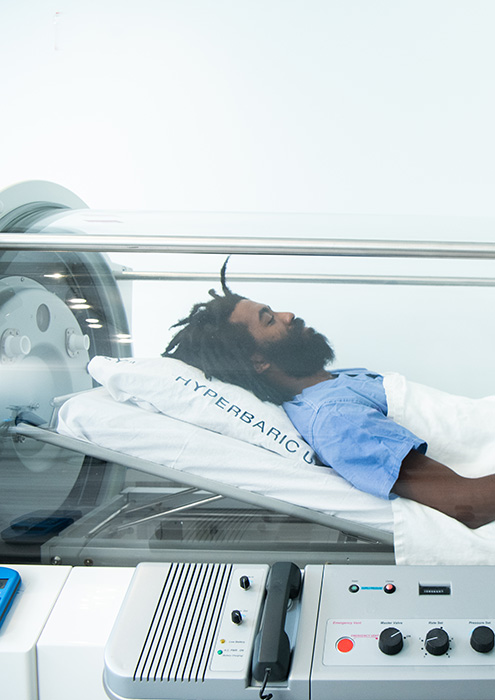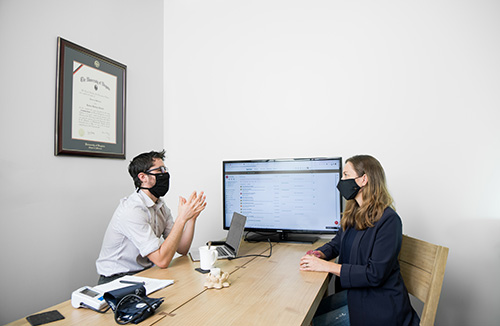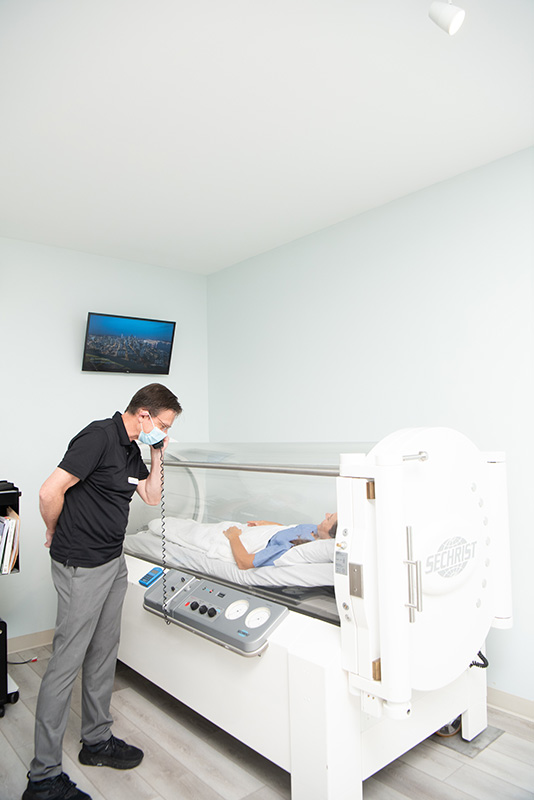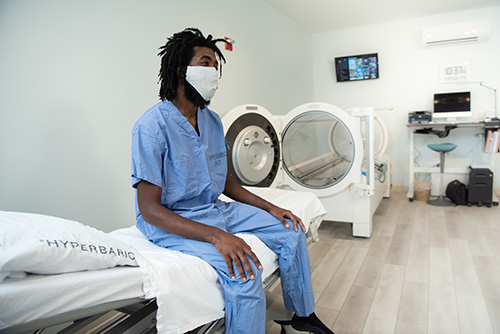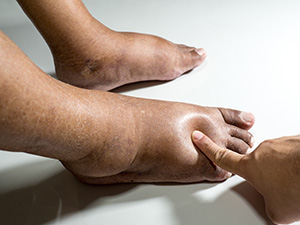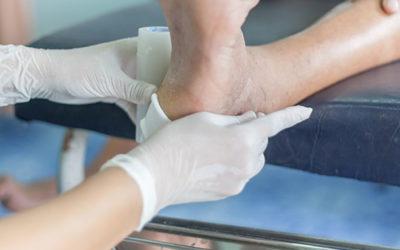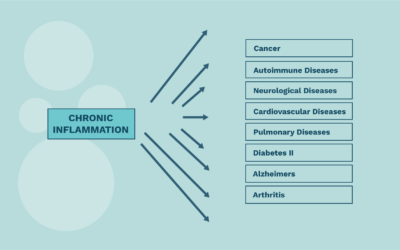 Hyperbaric Oxygen Therapy
Hyperbaric Oxygen Therapy
Now Open!
Click on titles to navigate:
» About hyperbaric oxygen therapy
» Treatable conditions
» What to expect
» FAQs
» Learn More
↓
 Hyperbaric Oxygen Therapy
Hyperbaric Oxygen Therapy
Now Open!
Click on titles to navigate:
» About hyperbaric oxygen therapy
» Treatable conditions
» What to expect
» FAQs
» Learn More
↓
About Hyperbaric Oxygen Therapy (HBOT)
Hyperbaric oxygen therapy is a non-invasive treatment modality in which a person breathes 100% oxygen while in a pressurized environment. This environment greatly increases the body’s exposure to oxygen causing a cascade of beneficial and clinically significant effects such as:
» Increased stem cell production
» Powerful anti-inflammatory
» Powerful antibacterial
» Angiogenesis
» Increased white blood cell production
The administration of pure oxygen at increased pressure causes up to 20 times more oxygen to be absorbed by the blood, plasma, spinal fluid, and other body fluids and is transferred to injured organs and tissues. This accelerates healing and recovery time in addition to providing other benefits such as healthy aging and general wellness maintenance.
Treatments are typically one hour long. They are safe, painless and comfortable with rare side-effects. The number of treatments prescribed varies based on established protocols and individual assessments.
Your body’s tissues need an adequate supply of oxygen to function. When tissue is injured, it requires even more oxygen to survive. Hyperbaric oxygen therapy increases the amount of oxygen your blood and plasma can carry. This increase in oxygen promotes accelerated healing, tissue function, and fights infection.
“Hyper” means increased, and “baric” refers to pressure. Hyperbaric oxygen therapy increases circulation and oxygenation, allowing the oxygen to build and repair damaged blood vessels, as well as triggering collagen growth, which leads to healing.
The increase in pressure also reduces inflammation and swelling, which in turn, increases blood flow. Oxygen also helps the body create new white blood cells, which helps the body fight off infection.
Over time, the increase of oxygen stimulates angiogenesis, which is new blood vessel formation in the tissues.
For patients who follow the recommended treatments, nutrition and wound care, hyperbaric oxygen therapy can speed up the healing process by three to five times.
- Anemia
- Autism
- Antiviral/Antibacterial
- Brain abscess
- Arterial gas embolism
- Burn
- Decompression sickness
- Carbon monoxide poisoning
- Crushing injury
- Deafness, sudden
- Gangrene
- Infection of skin or bone that causes tissue death
- Non-healing wounds, such as a diabetic foot ulcer
- Radiation injury
- Skin graft or skin flap at risk of tissue death
- Lyme disease
- AIDS/HIV
- Allergies
- Alzheimer’s disease
- Arthritis
- Asthma
- Post-traumatic stress (PTSD)
- Bell’s palsy
- Brain injury
- Cancer
- Cerebral palsy
- Chronic fatigue syndrome
- Cirrhosis
- Depression
- Enhanced Immune Function
- Fibromyalgia
- Gastrointestinal ulcers
- Heart disease
- Heatstroke
- Hepatitis
- Migraine
- Multiple sclerosis
- Parkinson’s disease
- Spinal cord injury
- Sports injury & sports performance
- Stroke
- long-COVID
Before hyperbaric oxygen therapy
Prior to undergoing hyperbaric oxygen therapy, you will need a prescription from your doctor or you can have a consultation with our in-house Medical Director, Dr. Rob Abbott, in order to determine whether you are a candidate for hyperbaric oxygen therapy and the protocol that suits your specific needs. Dr. Abbott may recommend other therapies in conjunction with hyperbaric oxygen therapy to ensure the best possible outcome for you.
During hyperbaric oxygen therapy
You will comfortably lie inside a hyperbaric chamber for 60-90 minutes per day during treatment. Many patients start out with about 20 treatments, however some protocols consist of 5 or fewer sessions. Treatments may be extended further, depending on the progress of healing.
The chamber is pressurized with 100 percent oxygen to the equivalent of diving 33 to 45 feet below sea level (2-3 times normal air pressure). The increased air pressure creates a temporary feeling of fullness in your ears — similar to what you might feel in an airplane or at a high altitude. You can relieve that feeling by yawning or swallowing. Your treatment is performed under medical supervision and you have the ability to communicate with someone at all times should you need anything.
This increase in pressure allows more oxygen to be dissolved into your plasma (up to 10 to 20 times more than normal). The air you normally breathe is about 21 percent oxygen. In a hyperbaric chamber, you are breathing roughly 200 percent to 240 percent oxygen.
After hyperbaric oxygen therapy
You may feel somewhat tired or hungry following your treatment. This doesn’t limit normal activities.
Hyperbaric Oxygen Therapy for Edema Reduction
How Does Hyperbaric Oxygen Therapy Heal Injured Tissue?
How Does Hyperbaric Oxygen Therapy Reduce Inflammation?
Can Hyperbaric Oxygen Therapy Treat Inflammatory Disease?
Can Hyperbaric Oxygen Therapy Help with Pain and Sports Injuries?
Can Hyperbaric Oxygen Therapy Heal Post Concussive Syndrome?
- PTSD
- Traumatic Brain Injury
- Autism
- Alzheimer’s Disease
- Cancer
- Multiple Sclerosis
- Sport Injury & Sport Performance
- Stroke Recovery
- Vision Loss
- Fibromyalgia
- Diabetes
- Carbon Monoxide Poisoning
- Other
→ Oxygen-dependent regulation of tumor growth and metastasis in human breast cancer xenografts.
→ Hyperbaric oxygen therapy and cancer—a review.
→ Hyperbaric oxygen therapy for postoperative ischemic bronchitis after resection of lung cancer.
→ Efficacy of Adjunctive Hyperbaric Oxygen Therapy in Osteoradionecrosis.
→ Hypoxia and hyperbaric oxygen therapy: a review.
→ Hyperbaric Oxygen Therapy Side Effects – Where Do We Stand?
→ Is There an Association Between Hyperbaric Oxygen Therapy and Improved Outcome of Deep Chemical Peeling? A Randomized Pilot Clinical Study.
→ Impact of Hyperbaric Oxygen on Tissue Healing around Dental Implants in Beagles.
→ Impact of Hyperbaric Oxygen on the Healing of Bone Tissues Around Implants.
→ Convulsive seizure and pulmonary edema during hyperbaric oxygen therapy:A case report.
→ Hyperbaric oxygen therapy in the treatment of central retinal artery occlusion.
→ Short-term effects on ocular variables immediately after hyperbaric oxygen exposures.
Contact us
Call Us
(434) 214-4847
Our Location
Charlottesville, VA 22902

